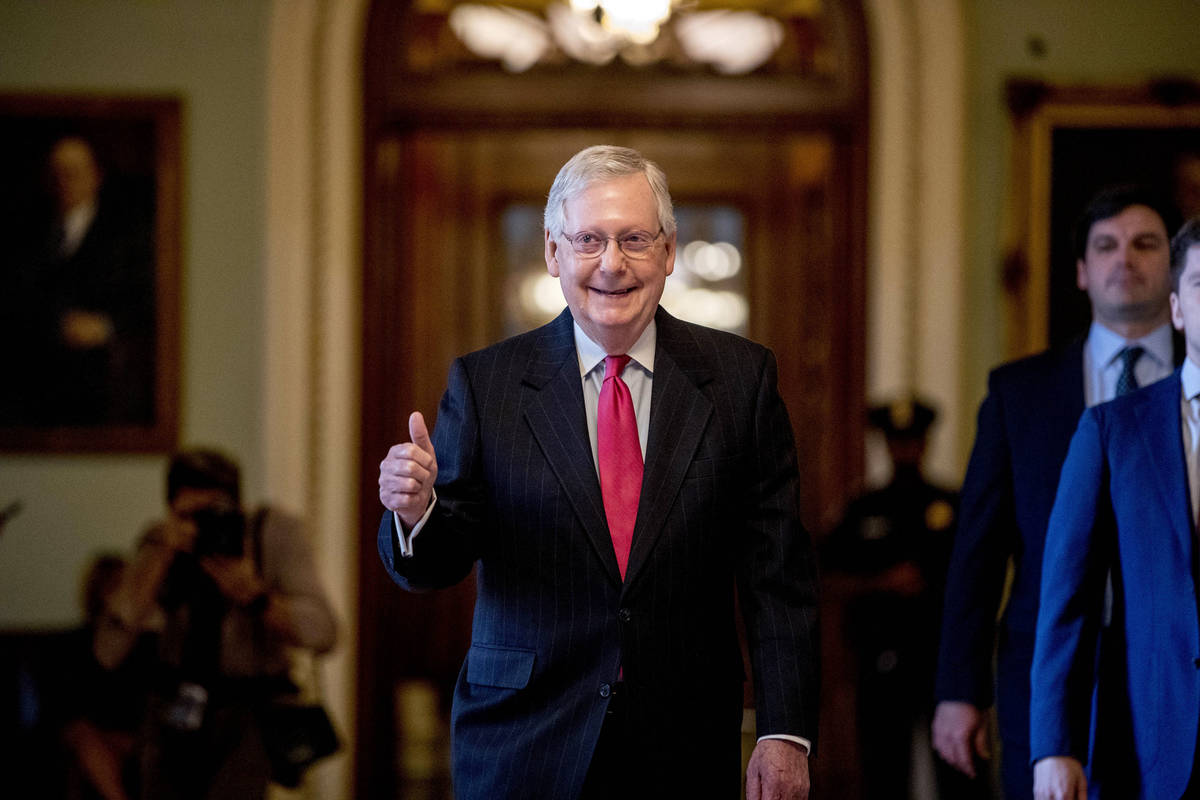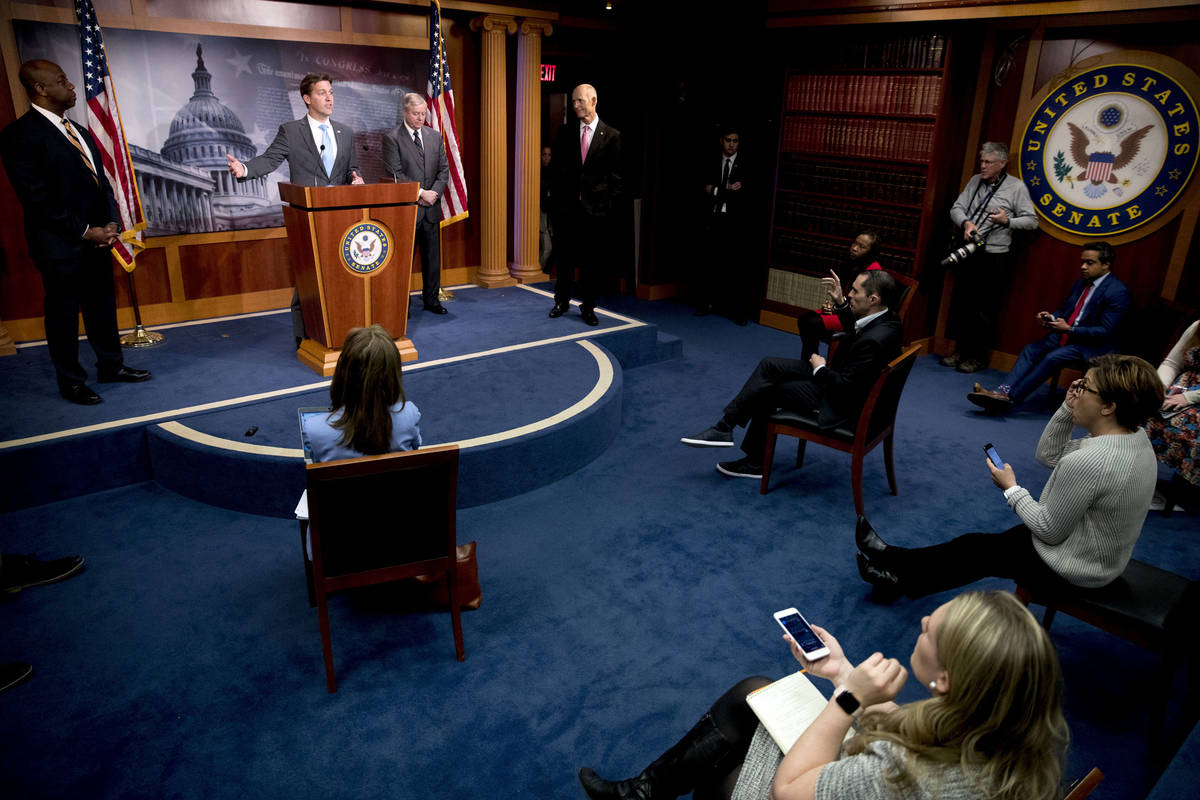Senate unanimously approves $2T coronavirus stimulus package
WASHINGTON — After days of partisan delays, the Senate voted unanimously Wednesday to pass a $2 trillion financial rescue package to save businesses and jobs at risk due to the coronavirus outbreak.
Hospitals, states and local and tribal governments would also get financial assistance in the bill cobbled together following days of intense negotiations between congressional leaders and the White House.
President Donald Trump praised the rescue legislation. He said it focused on “jobs, jobs, jobs and families, families, families.”
“It’s good news for all Americans,” said Senate Majority Leader Mitch McConnell, R-Ky.
Senate Minority Leader Chuck Schumer, D-N.Y., said the bill was the “largest rescue package in U.S. history,” creating a Marshall Plan for the American medical system and assistance for out-of-work employees that amounted to “unemployment on steroids.”
Sens. Catherine Cortez Masto and Jacky Rosen, both Nevada Democrats, voted for the bill, following negotiations that put tighter controls on loans to big businesses, doubled the amount of money to hospitals and extended unemployment benefits from three to four months.
“It is simply the greatest single investment in our economy and health care system in modern American history,” Cortez Masto said in a Senate floor speech. “And we need it.”
Cortez Masto invoked the Route 91 Harvest festival shooting and the 2007 housing crisis that wracked the state to remind people of the hardships Nevada has recently overcome.
She said the COVID-19 pandemic has crushed the gaming and hospitality industries, which generate $68 billion annually and support 450,000 jobs in the state.
Cortez Masto said the bill gives relief to those industries, provides transparency for loans and offers workers protections, in addition to helping small businesses and families.
“We will get through this together,” she said.
Benefits snag
The vote was delayed Wednesday after four Republican senators objected to generous unemployment benefits that they said would provide incentives not to work and place hardships on small businesses to retain employees.
“We want to fix what is broken here,” said Sen. Ben Sasse, R-Neb.
An amendment to make that fix failed to reach a 60-vote threshold, 48-48. Cortez Masto and Rosen voted against it.
The snag followed three days of delays by Democrats who wanted more aid for workers, hospitals and state and local governments, as well as other programs that Republicans said had no connection to the financial relief legislation.
Highlights of the bill’s offerings include:
■ $1,200 cash payments to most Americans.
■ $500 cash payments to most families for each child.
■ $500 billion for companies, states and local and tribal governments.
■ $367 billion to help small businesses.
■ $150 billion for hospitals.
Conditions on the assistance provided by the bill would prohibit the president, White House officials, members of Congress or their staffs from receiving federal money or loans in the package.
Language was also included to prevent companies from using the aid for stock buybacks or executive compensation, two things that marred the 2008 Wall Street bailout.
Nevada casino, hotels and tourism businesses would be eligible to apply for assistance designed to protect workers from layoffs and keep large companies solvent. The state’s lawmakers and the Vegas Chamber had lobbied for the aid.
“It’s a good start,” said Chris Cylke, senior vice president with the American Gaming Association, which represents commercial and tribal casino operators nationwide.
Cylke said the gaming industry has often been at a disadvantage compared with other industries during economic hardships caused by natural and other catastrophes. This bill would put the gaming industry on equal footing to apply and receive funds with others impacted by the economic downturn, he said.
All 465 commercial casinos in the United States have closed. With nearly 97 percent of tribal casinos also shuttered, roughly 649,000 workers are impacted financially, according to the AGA.
Democrats, as part of the negotiations, preserved collective bargaining rights and agreements in the bill. Most casino workers in Las Vegas belong to unions.
Aid for states, cities
Money for states and cities was also added to the legislation.
Governors have demanded help from the federal government in the form of medical equipment, while the U.S. Conference of Mayors sought $250 billion to offset costs incurred in fighting the pandemic, continue city services and avoid layoffs of municipal employees.
The mayors of Las Vegas, Henderson and Reno joined more than 300 mayors in seeking the funds.
Although the bill passed, a procedural vote on the bill was delayed Wednesday by the four Republicans who argued an additional $600 in unemployment benefits would provide more than a weekly salary for low-paid hourly workers, creating an incentive not to work after being laid off.
The delay was the latest in the past four days after Democrats blocked the bill and demanded more accountability and transparency for the aid to corporations.
Republicans also accused Democrats of trying to lard the bill with ideological programs and climate policies unrelated to the economic downturn caused by the coronavirus outbreak.
Environmental groups said the legislation was too friendly to industries.
Brett Hartl with the Center for Biological Diversity said corporate polluters received “big bucks while ordinary people who desperately need relief received relatively little.”
Hartl said environmental groups would force “the Trump administration to publicly reveal every shady deal they make to bail out climate-killing companies.”
The bill now goes to the Democrat-controlled House. Speaker Nancy Pelosi, D-Calif., said her caucus would review the legislation Thursday to determine their course of action.
House Minority Leader Kevin McCarthy, R-Calif., urged his caucus to pass the bill immediately, but several GOP lawmakers could delay a vote.
A move to pass the bill in the House on a voice vote, or with proxy votes to prevent lawmakers from returning from recess, was being discussed, a congressional aide said.
But a final draft of the legislation had not been released Wednesday afternoon to House members, prompting some lawmakers to say a Friday vote was more likely to allow members to read through the massive spending bill.
The president has urged lawmakers to pass the bill quickly and send it to him to sign into law.
Contact Gary Martin at gmartin@reviewjournal.com or 202-662-7390. Follow @garymartindc on Twitter.








































